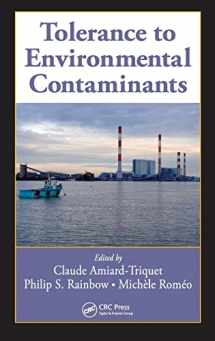
Tolerance to Environmental Contaminants (Environmental and Ecological Risk Assessment)
ISBN-13:
9781439817704
ISBN-10:
1439817707
Edition:
1
Author:
Claude Amiard-Triquet, Philip S. Rainbow, Michele Romeo
Publication date:
2011
Publisher:
CRC Press
Format:
Hardcover
464 pages
Category:
Civil & Environmental
,
Anatomy
,
Biological Sciences
,
Water Supply & Land Use
,
Nature & Ecology
,
Engineering
FREE US shipping
Book details
ISBN-13:
9781439817704
ISBN-10:
1439817707
Edition:
1
Author:
Claude Amiard-Triquet, Philip S. Rainbow, Michele Romeo
Publication date:
2011
Publisher:
CRC Press
Format:
Hardcover
464 pages
Category:
Civil & Environmental
,
Anatomy
,
Biological Sciences
,
Water Supply & Land Use
,
Nature & Ecology
,
Engineering
Summary
Tolerance to Environmental Contaminants (Environmental and Ecological Risk Assessment) (ISBN-13: 9781439817704 and ISBN-10: 1439817707), written by authors
Claude Amiard-Triquet, Philip S. Rainbow, Michele Romeo, was published by CRC Press in 2011.
With an overall rating of 4.2 stars, it's a notable title among other
Civil & Environmental
(Anatomy, Biological Sciences, Water Supply & Land Use, Nature & Ecology, Engineering) books. You can easily purchase or rent Tolerance to Environmental Contaminants (Environmental and Ecological Risk Assessment) (Hardcover) from BooksRun,
along with many other new and used
Civil & Environmental
books
and textbooks.
And, if you're looking to sell your copy, our current buyback offer is $0.3.
Description
Tolerance, the ability of populations to cope with the chemical stress resulting from toxic contaminants, has been described in many organisms from bacteria to fungi, from phytoplankton to terrestrial flowering plants, and from invertebrates such as worms to vertebrates like fish and amphibians. The building of tolerance, be it by physiological acclimation or genetic adaptation, can have great consequences for the local biodiversity, and hence the ecology and ecosystem functioning of many of the world’s habitats. Understanding the frequency of the occurrence of tolerance has tremendous implications for the sustainability of biodiversity and ecosystem functioning. Tolerance to Environmental Contaminants takes a multidisciplinary approach across contaminant types, habitats, organisms, biological levels of organization and scientific disciplines. The book examines the general principles governing the acquisition and biological consequences of tolerance, genetically or physiologically based, at different levels of biological organization, taxonomically from bacteria and archaea to flowering plants and vertebrates, and within organisms from molecular biology and biochemistry through physiology to whole organism, community, and ecosystem levels of organization. Presenting a state-of-the-art synthesis of the many aspects of the phenomenon of tolerance to environmental contaminants, this volume covers mechanisms of defense involved in the acquisition of tolerance, different classes of environmental contaminants, positive and negative ecological consequences of tolerance and the impact of tolerance in bacteria, plants, and insects on society. The reviews presented in this book supply the tools for carrying out more informed and therefore more reliable risk-benefit analyses when assessing the ecotoxicological risks to life in any of the contaminated habitats that now surround us in our industrialized society.


We would LOVE it if you could help us and other readers by reviewing the book
Book review

Congratulations! We have received your book review.
{user}
{createdAt}
by {truncated_author}


